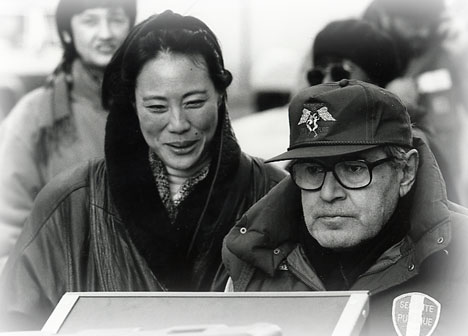|
ASIAN AMERICAN PERSONALITIES |
CONTACT US
|
ADVERTISING INFO
© 1996-2013 Asian Media Group Inc
No part of the contents of this site may be reproduced without prior written permission.
GOLDSEA | ASIAMS.NET | ASIAN AMERICAN PERSONALITIES
Manifest Destiny
PAGE 6 OF 8
JY: We saw each other around a lot. He was more of a line guy on Oliver's movies and I was more the creative producer on other people's movies. We saw each other quite a bit but didn't actually work together until we made The Weight of Water.

Producer Janet Yang with multiple-Academy Award winning director Milos Forman during filming of The People vs. Larry Flynt (1996).
GS: You guys shared the credit with Oliver Stone on The Savior. How did that come about?
JY: That was kind of a transition project. It was something Oliver was interested in. I brought it into the company when I was still with Oliver but as with so many movies, by the time it got made, I was no longer with Oliver. However it was the film I was kinda making when I first started Manifest but Oliver was still somewhat involved.
GS: So you took it with you to Manifest and Oliver stayed attached?
JY: I worked out some arrangement where we would share compensation and credits.
GS: You're also working on a project called The Swedish Job.
JY: The Swedish Job was in pre-production. It got postponed. It was supposed to go this year.
GS: What other projects are you working on now?
JY: I'm waiting for a couple of scripts to come in. I have developed a number of projects set in and around Asia. I just told you about one of them. I have something I'm waiting to go out with after The Last Samurai comes in. It's written by Drew Beattie who is a pretty hot writer now because his other project is directed by Michael Mann and stars Tom Cruise. My project is set in Japan and it's kind of a martial arts movie but a very fun dramatic one.
If The Last Samurai does well, people will be looking for projects that are a younger edgier version. In fact they're very different but if people think a movie set in Japan can be successful, it will help our project a lot.
The next one, I have a project at Miramax that's set in China. Then I have a smattering of other projects as well. I have a live stage show and some other projects that aren't Asian themed.
GS: You seem committed to playing up Asian themes
JY: Yeah. China has broken my heart before. I don't mean China per se but the speed at which people are willing to embrace China. I have to maintain some balance between my agenda, my passion, and what is realistic.
CONTINUED BELOW
GS: Do you feel like we're in a retreat from the progress we had made in the 80s and even the 90s?
JY: No, Crouching Tiger has pushed things to a whole new level. Unfortunately, it's just gotten people to pay attention to martial arts movies. But at least they're not scared of putting Asians in movies. They're not so scared of Asian language movies. This whole Corean remake craze is amusing to me because so many of those directors studied in America. So in their minds they were concentrating on studying American movies and taking them back to Corea, and now the Americans are buying those ideas back, and it's kinda funny.
It's like a cycle. I'm a little bit tired of all the wirework in the movies. I think there's room for other kinds of martial arts. But I guess it's encouraging that Hong Kong wireworks can be so wholeheartedly embraced. That's only the tip of the iceberg as far as I'm concerned.
GS: But Hong Kong movies have been proven to work wth a big audience.
JY: Yeah, it worked in Asia. And the same with the Corean films with a small market. They seem content with having it be successful on a small scale.
GS: Now that you're on your own, what special ability do you bring to producing movies?
JY: I'm a much better producer today than I was 10 years ago. Much better. I was trying to do too many things back then when I was running Oliver's company, producing and developing and this and that. I think I'm a pretty good all-around producer. My specialty is any project with Asian content, because I know the production landscape in China and other parts of Asia. I have a level of passion, lack of fear for going to a country in Asia or anywhere. I really feel like I'm quite an international producer. I went to Sweden and felt totally comfortable. Twice I've done reshooting in Mexico and I felt totally comfortable. I feel like there is a kind of film language that's really universal. I have a project that I really want to do in India. I was in South Africa, and I really liked being in South Africa. I'm just not afraid of working internationally.
GS: Sounds like you like local color.
JY: I do. For me it's just what makes life interesting. When I'm turned on, you get better work out of me.
But just in general I'm very committed to my projects. I'm a solid all around producer. I work well with writers. I'm not a screamer. I've actually found that it really is detrimental to have a big ego. I know that some producers do but I found that so often there's not enough air in the room to have more than one big ego. If you have to be with someone egotistical, you can't function very well. You get three or four, forget it.
PAGE 7
| “I'm not a screamer. I've actually found that it really is detrimental to have a big ego.” |
